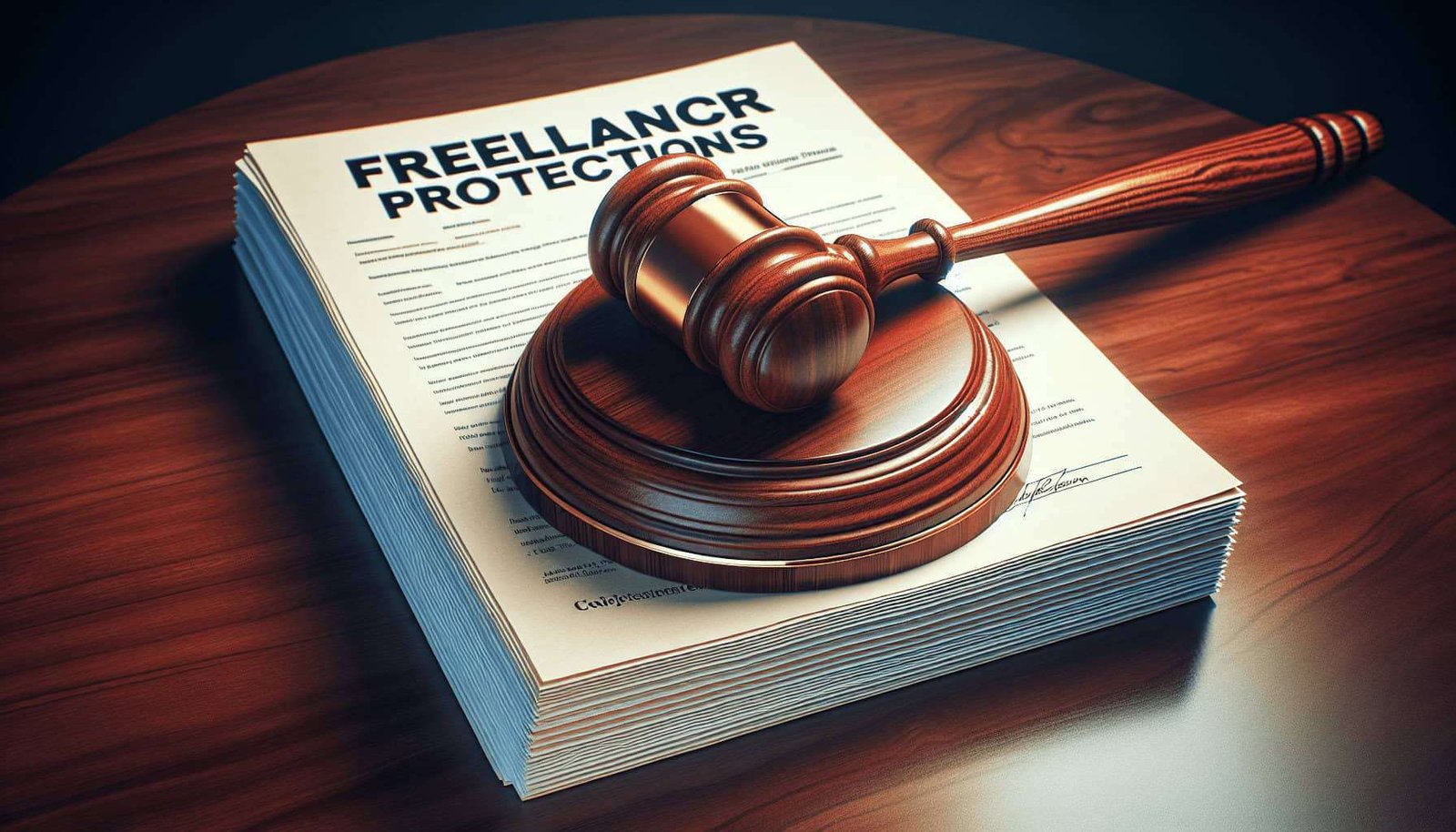In this New York Legislative Update, you will discover the latest developments in freelancer protections, discrimination claims, and settlement agreements. With the rise of the gig economy and an increasing number of Americans turning to freelance work, it has become crucial to address the unique challenges faced by freelancers in terms of fair treatment, payment, and legal rights. This article will provide you with a comprehensive overview of the recent legislative changes in New York that aim to protect the rights and interests of freelancers. From the “Freelance Isn’t Free” act to new measures against discrimination claims, you will gain valuable insight into the evolving landscape of freelance work in the state of New York. Whether you are a freelancer or simply interested in staying informed about the latest legislation impacting the gig economy, this article is a must-read.

New York Legislative Update
Welcome to the comprehensive update on the latest legislative changes in New York that affect freelancers and the gig economy. In this article, we will cover the new protections for freelancers, discrimination claims, settlement agreements, and the overall impact on the freelancer economy. We will also discuss recent developments, available resources for freelancers, and legal considerations for employers. Finally, we will explore the future implications of these changes and provide a call to action for both freelancers and employers. So let’s dive in and explore how these new laws and regulations could impact you.
Freelancer Protections
Overview of Freelancer Protections
New York has taken steps to provide greater protections for freelancers with the passage of the ‘Freelance Isn’t Free’ Act. This act aims to address the issues often faced by freelancers, such as non-payment or delayed payment for their services. It establishes clear rights and obligations for both freelancers and clients.
Details of the ‘Freelance Isn’t Free’ Act
The ‘Freelance Isn’t Free’ Act requires that all freelancers in New York are provided with a written contract for their services. This contract must include information on the scope of work, rate of pay, and payment terms. It also sets a deadline for payment, which should typically be within 30 days of the completion of the work.
Impact on Freelancers
The ‘Freelance Isn’t Free’ Act has a significant impact on the lives and livelihoods of freelancers. By ensuring that they have a written contract and clear payment terms, freelancers have greater certainty and protection when it comes to receiving payment for their work. This legislation empowers freelancers to demand fair compensation and avoid the financial hardships often associated with late or non-payment.
Enforcement and Penalties
To enforce the ‘Freelance Isn’t Free’ Act, the New York City Department of Consumer Affairs (DCA) has the authority to take legal action against clients who fail to pay freelancers within the specified timeframe. Penalties for non-compliance can range from $250 to $25,000, depending on the circumstances and the severity of the violation.
Legal Resources for Freelancers
Freelancers who encounter issues with non-payment or other disputes can seek legal assistance from various resources. Organizations like Legal Aid and other advocacy groups provide free or low-cost legal services to freelancers. Additionally, there are websites and platforms specific to freelancers that offer resources, information, and networking opportunities within the freelance community.
Discrimination Claims
Overview of Discrimination Laws in New York
New York has long-standing laws in place that protect workers from various forms of discrimination. These laws apply to freelancers as well and prohibit discrimination based on factors such as race, gender, age, disability, sexual orientation, and more.
Expanded Protections for Freelancers
In recent legislative updates, New York expanded the scope of its discrimination laws to include freelancers. This means that freelancers are now protected against discrimination in their work, and employers can be held accountable for discriminatory practices.
Types of Discrimination Claims
Freelancers can file discrimination claims if they believe they have been treated unfairly or were not given equal opportunities due to their protected characteristics. Common types of discrimination claims include racial discrimination, gender discrimination, age discrimination, disability discrimination, and sexual orientation discrimination.
Legal Remedies for Discrimination
If a freelancer successfully proves their discrimination claim, they may be entitled to various legal remedies. These can include monetary damages, reinstatement to the same or a similar position, injunctive relief to stop discriminatory practices, and attorney fees. It’s important for freelancers to understand their rights and seek legal advice if they believe they have been discriminated against.
Settlement Agreements
Importance of Settlement Agreements
Settlement agreements are legally binding contracts that resolve disputes between parties without the need for litigation. For freelancers, settlement agreements can provide a means to resolve payment disputes, discrimination claims, or other issues with their clients in a mutually agreed-upon manner.
New York Laws Governing Settlement Agreements
New York has specific laws and regulations that govern settlement agreements. These laws ensure that settlement agreements are fair, voluntary, and protect the rights of all parties involved. It’s important for freelancers to be aware of these laws and consult with legal professionals when negotiating and entering into settlement agreements.
Key Provisions in Settlement Agreements
When drafting a settlement agreement, there are key provisions that should be included to protect the freelancer’s interests. These provisions may cover the payment of outstanding fees, terms of confidentiality, release of claims, and any other specific agreements reached between the freelancer and the client.
Enforceability and Challenges
Once a settlement agreement is signed by both parties, it becomes legally binding and enforceable. However, challenges can arise if one party fails to fulfill their obligations under the agreement. In such cases, the aggrieved party may need to seek legal remedies to enforce the terms of the settlement agreement.

Impact on Freelancer Economy
Increased Protection for Freelancers
The new legislative changes in New York provide increased protection for freelancers, which has a positive impact on the overall freelancer economy. Freelancers can now have greater peace of mind knowing that they are legally entitled to fair and timely payment for their services. This increased protection can lead to increased confidence in the freelance industry, attracting more professionals to pursue freelance work.
Strengthening the Freelancer Economy
By safeguarding the rights and interests of freelancers, New York is nurturing a stronger freelance economy. The ability to demand fair compensation and work in an environment free from discrimination encourages more individuals to pursue freelance careers. This, in turn, promotes competition, innovation, and economic growth.
Challenges and Controversies
While the legislative changes are a step forward for freelancers, there are challenges and controversies that arise. Some clients may resist the new regulations, while others may exploit loopholes to avoid compliance. Additionally, there may be concerns about potential unintended consequences, such as increased costs for businesses that rely on freelance services.
Recent Developments
Updates on Legislative Changes
It’s important for freelancers to stay informed about any updates or revisions to the legislation that affects them. The freelancer protections, discrimination laws, and settlement agreement regulations in New York may be subject to changes or amendments over time. Freelancers should follow relevant news sources, consult legal professionals, and stay engaged with professional associations to stay up to date with the latest developments.
Impact of COVID-19 on Freelancers
The COVID-19 pandemic has had a significant impact on the freelance industry. Many freelancers faced challenges due to the economic downturn and the changing demands of businesses. It’s important for freelancers to adapt to the evolving landscape, seek available government assistance, and explore new opportunities that arise during and after the pandemic.
Industry Reactions and Responses
The new legislative changes have received mixed reactions from different stakeholders in the industry. While freelancers generally welcome the increased protections, some businesses may express concerns about the potential impact on their operations and costs. It is crucial for all parties involved to engage in constructive dialogue and work towards creating a balanced and fair environment for both freelancers and employers.

Resources for Freelancers
Government Agencies and Organizations
Freelancers can seek assistance and information from various government agencies and organizations. The New York City Department of Consumer Affairs (DCA) plays a significant role in enforcing the ‘Freelance Isn’t Free’ Act and can provide guidance on contractual obligations and payment disputes. Additionally, organizations like Legal Aid and advocacy groups offer legal resources and support to freelancers.
Legal Aid and Advocacy Groups
Legal Aid organizations and advocacy groups specifically cater to freelancers’ legal needs. These organizations offer free or low-cost legal services, including legal advice, representation during disputes, and information on rights and responsibilities.
Websites and Platforms for Freelancers
Several websites and platforms cater to freelancers, providing valuable resources, job postings, networking opportunities, and professional development resources. These platforms can help freelancers stay connected with the freelance community and find new job opportunities.
Professional Associations and Networks
Freelancers can benefit from joining professional associations and networks that are inclusive of their industry or specialization. These associations provide access to industry-specific resources, networking events, professional development opportunities, and a sense of community among freelancers.
Legal Considerations for Employers
Understanding Employer Obligations
Employers must understand their obligations under the new legislation to ensure compliance. This includes providing written contracts, adhering to payment terms, and avoiding discriminatory practices. Employers should familiarize themselves with the specific requirements and consult with legal professionals to ensure they are meeting their obligations.
Best Practices for Compliance
To comply with the legislation and promote a fair and inclusive working environment, employers should establish best practices. This can include developing clear policies and procedures for engaging with freelancers, ensuring prompt payment, offering equal opportunities, and providing a mechanism for addressing grievances or disputes.
Avoiding Discrimination Claims
Employers should take proactive measures to avoid discrimination claims. This can involve implementing policies that promote diversity and inclusion, providing equal opportunities to all freelancers, and addressing any complaints or concerns promptly and respectfully.
Negotiating Settlement Agreements
Settlement agreements can be an effective way to resolve disputes between employers and freelancers. When negotiating settlement agreements, employers should strive for fairness and ensure that the terms protect the interests of both parties. Legal advice should be sought to ensure the agreement is legally binding and enforceable.

Future Implications
Potential Impact on Other Jurisdictions
The legislative changes in New York could have a ripple effect on other jurisdictions. As other states or countries observe the positive impact of freelancer protections, they may be inspired to implement similar legislation to support and empower their own freelance communities.
Trends and Predictions for Freelancer Legislation
The landscape of freelance legislation is likely to continue evolving as the gig economy grows. Trends suggest that more jurisdictions will consider introducing or expanding freelance protections to address the unique challenges faced by this dynamic workforce. It’s important for freelancers to stay informed about these trends and engage in advocacy efforts to shape the future of freelancer legislation.
The Future of Freelancer Protections
Freelancer protections are vital to ensuring a fair and equitable work environment for freelancers. The future holds the potential for further advancements in freelancer legislation, with increased emphasis on addressing emerging challenges such as technological disruptions, evolving work arrangements, and the dynamic nature of the gig economy.
Conclusion
In conclusion, the legislative updates in New York provide significant protections and benefits for freelancers. The ‘Freelance Isn’t Free’ Act establishes clear rights and obligations, safeguarding freelancers from non-payment and late payment issues. Discrimination laws now extend to freelancers, ensuring equal opportunities and fair treatment. Settlement agreements offer a means to resolve disputes without litigation. These changes strengthen the freelancer economy and empower freelancers to demand fair compensation. It is important for freelancers to stay informed about the latest developments, utilize available resources, and engage in advocacy efforts. Employers must understand their obligations, implement best practices, and be proactive in promoting a fair and inclusive working environment for freelancers. The future holds promising implications for further advancements in freelancer legislation, and it is crucial for freelancers and employers to work together towards a thriving and equitable freelance ecosystem.


